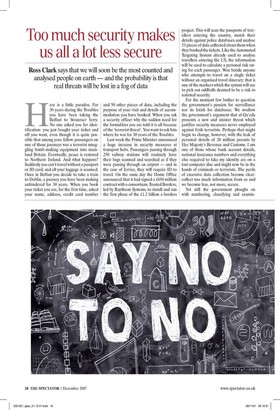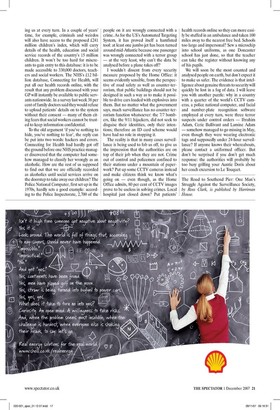Too much security makes us all a lot less secure
Ross Clark says that we will soon be the most counted and analysed people on earth — and the probability is that real threats will be lost in a fog of data Here is a little paradox. For 30 years during the Troubles you have been taking the Belfast to Stranraer ferry. No one asked you for identification: you just bought your ticket and off you went, even though it is quite possible that among your fellow passengers on one of those journeys was a terrorist smuggling bomb-making equipment into mainland Britain. Eventually, peace is restored to Northern Ireland. And what happens? Suddenly you can't travel without a passport or ID card, and all your luggage is scanned. Once in Belfast you decide to take a train to Dublin, a journey you have been making unhindered for 30 years. When you book your ticket you are, for the first time, asked your name, address, credit card number and 50 other pieces of data, including the purpose of your visit and details of accommodation you have booked. When you ask a security officer why the sudden need for the formalities you are told it is all because of the 'terrorist threat'. You want to ask him where he was for 30 years of the Troubles.
Last week the Prime Minister announced a huge increase in security measures at transport hubs. Passengers passing through 250 railway stations will routinely have their bags scanned and searched as if they were passing through an airport — and in the case of ferries, they will require ID to travel. On the same day the Home Office announced that it had signed a £650 million contract with a consortium, Trusted Borders, led by Raytheon Systems, to install and run the first phase of the £1.2 billion e-borders project. This will scan the passports of travellers entering the country, match their details against police databases and analyse 53 pieces of data collected about them when they booked the tickets. Like the Automated Targeting System already used to analyse travellers entering the US, the information will be used to calculate a personal risk rating for each passenger. Woe betide anyone who attempts to travel on a single ticket without an organised travel itinerary: that is one of the markers which the system will use to pick out oddballs deemed to be a risk to national security.
For the moment few bother to question the government's passion for surveillance nor its fetish for databases. We swallow the government's argument that al-Qa'eda presents a new and sinister threat which justifies security measures never employed against Irish terrorists. Perhaps that might begin to change, however, with the leak of personal details of 20 million parents by Her Majesty's Revenue and Customs. I am one of those whose bank account details, national insurance numbers and everything else required to fake my identity are on a lost computer disc and might now be in the hands of criminals or terrorists. The perils of excessive data collection become clear: collect too much information from us and we become less, not more, secure.
Yet still the government ploughs on with numbering, classifying and examining us at every turn. In a couple of years' time, for example, criminals and weirdos will also have access to the proposed £241 million children's index, which will carry details of the health, education and social service records of the country's 15 million children. It won't be too hard for miscreants to gain entry to this database: it is to be made accessible to 330,000 doctors, teachers and social workers. The NHS's £12 billion database, Connecting for Health, will put all our health records online, with the result that any problem discussed with your GP will instantly be available to public servants nationwide. In a survey last week 38 per cent of family doctors said they would refuse to upload patients' details on to the system without their consent — many of them citing fears that social workers cannot be trusted to keep information confidential.
To the old argument 'if you've nothing to hide, you've nothing to fear', the reply can be put into two words: hackers and errors. Connecting for Health had hardly got off the ground before one NHS practice manager discovered that the computer had somehow managed to classify her wrongly as an alcoholic. How are the rest of us supposed to find out that we are officially recorded as alcoholics until social services arrive on the doorstep to take away our children? The Police National Computer, first set up in the 1970s, hardly sets a good example: according to the Police Inspectorate, 2,700 of the people on it are wrongly connected with a crime. As for the US's Automated Targeting System, it has proved itself a hamfisted tool: at least one jumbo jet has been turned around mid-Atlantic because one passenger was wrongly connected with a terror group — at the very least, why can't the data be analysed before a plane takes off?
I wouldn't dissent from every security measure proposed by the Home Office: it seems evidently sensible, from the perspective of road safety as well as counter-terrorism, that public buildings should not be designed in such a way as to make it possible to drive cars loaded with explosives into them. But no matter what the government says, much surveillance has no counter-terrorism function whatsoever: the 7/7 bombers, like the 9/11 hijackers, did not seek to disguise their identities, only their intentions; therefore an ID card scheme would have had no role in stopping it.
The reality is that in many cases surveillance is being used to fob us off, to give us the impression that the authorities are on top of their job when they are not. Crime out of control and policemen confined to their stations under a mountain of paperwork? Put up some CCTV cameras instead and make citizens think we know what's going on — even though, as the Home Office admits, 80 per cent of CCTV images prove to be useless in solving crimes. Local hospital just closed down? Put patients' health records online so they can more easily be stuffed in an ambulance and taken 100 miles away to the nearest free bed. Schools too large and impersonal? Sew a microchip into school uniforms, as one Doncaster school has just done, so that the teacher can take the register without knowing any of his pupils.
We will soon be the most counted and analysed people on earth, but don't expect it to make us safer. The evidence is that intelligence about genuine threats to security will quickly be lost in a fog of data. I will leave you with another puzzle: why in a country with a quarter of the world's CCTV cameras, a police national computer, and facial and number-plate recognition software employed at every turn, were three terror suspects under control orders — Ibrahim Adam, Cerie Bullivant and Lamine Adam — somehow managed to go missing in May, even though they were wearing electronic tags and supposedly under 24-hour surveillance? If anyone knows their whereabouts, please contact a uniformed officer. But don't be surprised if you don't get much response: the authorities will probably be too busy grilling your Auntie Doris about her coach excursion to Le Touquet.
The Road to Southend Pier: One Man's Struggle Against the Surveillance Society, by Ross Clark, is published by Harriman House.






































































 Previous page
Previous page